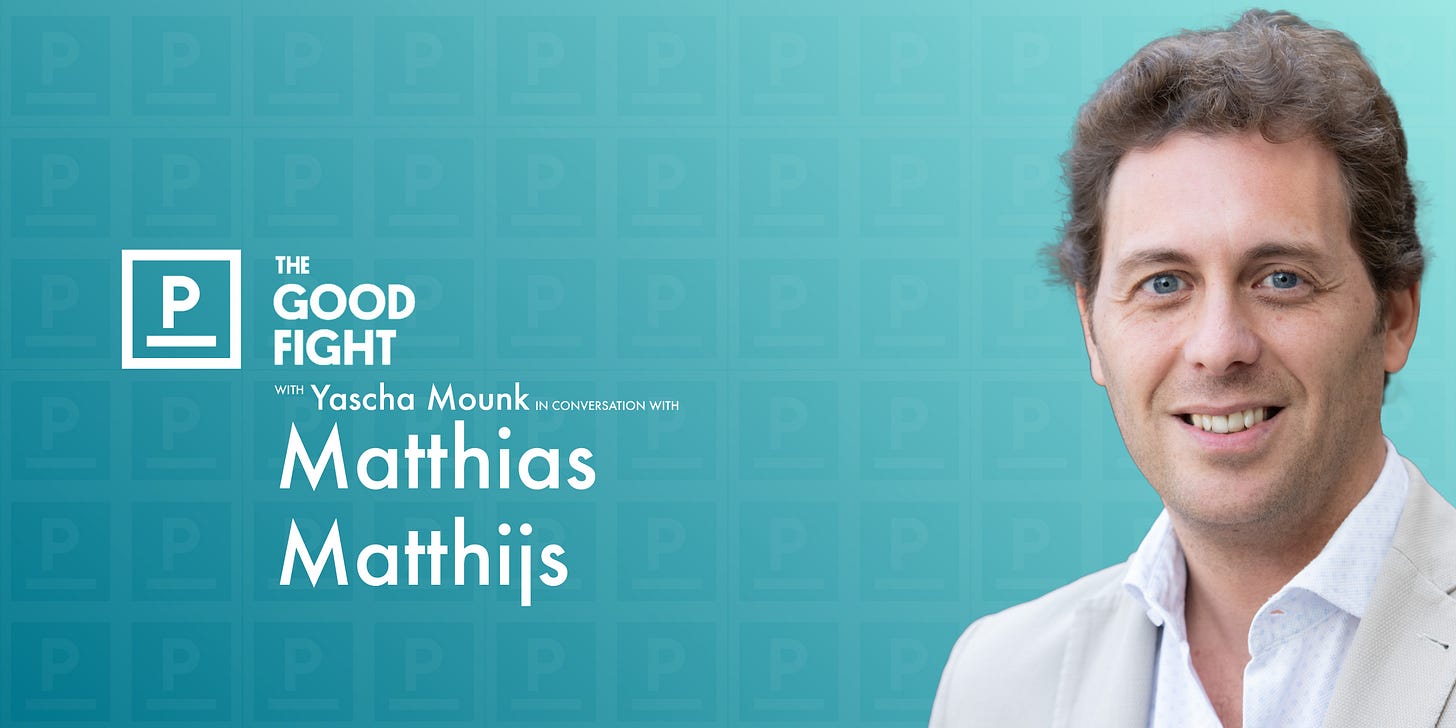Matthias Matthijs is Associate Professor of International Political Economy at Johns Hopkins University's School of Advanced International Studies and Senior Fellow for Europe at the Council on Foreign Relations.
In this week’s conversation, Yascha Mounk and Matthias Matthijs discuss Germany’s Zeitenwende and why the country has found greater success than its European peers in countering right-wing populism; the spoiler potential of the European right-wing from Giorgia Meloni to Viktor Orbán; and why, despite the long road ahead, Matthijs remains optimistic about the European project.
The views expressed are those of the speakers, not those of Persuasion. The transcript has been condensed and lightly edited for clarity.
Yascha Mounk: My sense is that Europe has felt like a stagnant or even declining continent for a long time. It faces both a real security challenge with the war in Ukraine and, in a way, the obsolescence of its geostrategic geopolitical model of the last decades. You also see the rise of these right-wing populist movements across the continent.
But at the same time, Europe seems more resilient than we might have thought, with decent economic performance in much of the continent and right-wing populists not yet able to actually subvert democracy, at least in most of western and northern European countries, though the record looks much more concerning in central Europe, and solidarity with Ukraine is holding up for now. What is the state of Europe? How do we make sense of these contradictions?
Matthias Matthijs: In the last 10 to 12 years, you could say with the onset of the euro crisis in late 2009, there has been a series of integration crises that really have been at the heart of the EU, whether it was the euro, the single markets, debt, migrants or the security crisis over Ukraine, which started in 2014. Those 10 years are significant in the sense that they're reminiscent of the 1970s and even the 1940s; these were big decades of crises for the European project. In the 1950s, it started; in the ‘70s, it stalled; and in the ‘80s it got a new lease on life.
My cautious optimism comes from the fact that this decade is over, and that there's now external pressures on Europe to get its act together when it comes to strategic autonomy and economic questions. There's this old saying by Jean Monnet, “Europe moves forward through crisis.” I've always thought that was dangerous, because it's kind of a reassuring frame for EU elites to say that every crisis somehow has a silver lining, which I think is naive. That said, crises in the past have led to progress in the European project if (and only if) national elites of key member states—traditionally, Germany, France, Italy, Poland, and so on—share a common view of how to move forward. We're potentially at a moment right now, because of the external pressures, which started with the Trump presidency, followed by Putin's invasion of Ukraine, and also the pandemic which has pushed Europe into a much more solidaristic direction.
Mounk: If I understand correctly, you're basically saying that Europe is moving in a coherent direction, and actually has the answers to some of those strategic challenges. I'm a little surprised by that, because for all of Europe’s strengths, it seems to me that Germany, for example, has not yet come to terms with what Zeitenwende means; that Germany is going to be able to provide for the insecurity to a meaningful extent and help countries that are under attack from authoritarian powers that want to subvert the basic order. Germany has not yet moved to do all that much for that.
When it comes to the EU, we still seem to be stuck in this slightly weird nether zone where we're not willing to do as much integration as it would take for things like the single currency to really work well over the long run. But no one is really talking about taking a step back and dissolving it. What is the nature of this kind of common vision of European elites that you think both exists and is coherent?
Matthijs: Everything you point out is correct. We're at the beginning of this moment. We're still in the fog of it and it's hard to see. We're at the beginning of a concept: you can call it EU sovereignty, you can call it strategic autonomy, the Commission prefers to call it “open strategic autonomy.” The beauty of those terms is that they're vague. Different countries have different interpretations of what they mean, which if you're a good diplomat usually means that you can move forward on something, right?
A few things have happened that made me slightly more optimistic. Number one, the UK has left. If the UK hadn't left on January 31st, 2020, the pandemic resilience fund that came together over the summer in record time wouldn't have happened as fast as it did and wouldn't have been as generous as it was. That's not a Hamiltonian moment in the sense that this is what Europe would need to make the Eurozone work. But it's the beginning. It's something they can build on if there are future crises because there will be money left. The invasion of Ukraine meant dramatic change for Germany. The Zeitenwende speech was key. They haven't lived up to it, I agree. But the things they've set in motion, no longer the end of Nord Stream 2, but the end of Nord Stream 1; the fact that they are going to spend significantly more money on defense. Whether they're going to buy American weapons or French weapons—these are all things to be sorted out. But there's no going back to February 23rd, 2022, before Russia invaded Ukraine. I'm optimistic in the sense that none of these things even happened in the last three years and that now they're on the agenda. They've happened to some extent and EU leaders and future leaders can build on it.
Also read: “The War is Changing Germany” by Piotr Buras.
Mounk: What do you think about the internal political state of European nations? It's one thing to think about what the EU is going to do. The coherence of the EU is really quite challenged by the presence of countries like Hungary and Poland that are acting the spoiler in many ways. But if you get similar kinds of governments in other European nations, the ability of the bloc to act will be reduced further. Of course, there are concerns about the stability of democracies internally: when Giorgia Meloni was elected as prime minister of Italy a few months ago, even US media outlets, which usually ignore Italian politics, were covering that event quite intensely for the natural reason that Meloni comes from a party that is associated with Italy's fascist past.
To what extent do you think European countries are managing, even as some of those far-right populist parties continue to be influential in some places, to preserve democratic institutions despite those challenges?
Matthijs: I tend to think about how member states behave within the European Union through Albert Hirschman's old idea of “Exit, Voice, and Loyalty.” The exit option was clearly chosen by the United Kingdom, and the experience that they have had exiting the EU has been so dramatic and so disastrous that it became a UK problem rather than an EU problem and triggered in the minds of many Euroskeptics, both left and right (but of course, it's the right wing ones that are in power in some countries), a dramatic rethink of how they see European integration. If you take Orbán or Meloni, for example, what they really want is to reform Europe from within. They don't want to leave the euro (Hungary is not a member of the euro, but Italy clearly is). They don't want to leave any of the structures or the institutions, but they want to change the soft- and hardware on which those institutions are run.
What did Meloni learn from both Brexit and from the earlier experiment of populism Italy had in 2018? Don't mess with the markets. Don't sow panic by talking about parallel currencies or about exiting from the fiscal side of the eurozone and things like this. That's also true for Orbán in Hungary. There's real money on the table. And so that's what I was referring to earlier, the next generation EU pandemic recovery funds, which was agreed on in the summer of 2020. The money started flowing in January 2021. For those countries, this is a significant amount of the economy. It's a few percentage points of GDP. If Maloney wants to secure something close to 80 billion euros over the next few years, she needs to play the game by the EU rules. And she knows that. What you have seen is no panic in bond markets since she came to power. But, of course, what you do see happening is things on migration, internal questions of democracy, rule of law. That's more problematic.
Mounk: I'm more skeptical when it comes to Orbán. There is a long-going conversation about doing something meaningful to impede the extent to which he has taken power within Hungary and concentrated it in his own hands; made the media landscape within the country incredibly homogeneous and undermined freedom of speech in serious ways such that ordinary citizens are afraid to speak up; pushed independent institutions like the Central European University to leave the country; channeled a vast amount of money into the hands of his friends and associates and undermined the rule of law.
All throughout, Orbán has been willing to play a game of “two steps forward, one step back.” He’s been willing to make very extreme proposals and then take back the most egregious parts of them while preserving other elements, which has helped him build his power. What makes you think that there is some reason to assume that Orbán will, in fact, relinquish some of his concentration of power rather than continuing to buy himself time and keep the money flowing from Brussels to Budapest?
Matthijs: I think that ship has sailed. My friend and co-author Dan Kelemen at Rutgers University told me 10 years ago that this was the biggest crisis for the EU, because it was about internal values and the rule of law and democracy, and that this was going to be very hard to solve, and compared to that the euro crisis and migration are actually quite easy. I didn't believe him at the time. Now, I think he is absolutely right. So what I was referring to is the Trojan Horse side of Orbán; that he was going to bring Putin's interests within the EU and basically ensure that the EU can’t act abroad because they need unanimity in foreign policy.
When it comes to the rule of law, Orbán is saying “I'm democratically elected. We do things differently in Hungary, and this is what the people want.” He’s never broken a rule internally, in that sense: he had two-thirds majorities and could legally change the constitution and so on—a very different story from Poland. If the EU wants real change domestically, they're going to have to be much tougher on the money, and they're not willing to do that yet because of Ukraine. If that conflict somehow gets solved (and it's hard to believe that it will anytime soon) then they're probably going to get tougher, because there's real money on the line.
It's easy to point the finger at the European Commission for being weak, but the Commission needs the Council, and that’s where the heads of state or government are sitting, and they all tend to have a veto. That's where countries like Germany have been very reluctant to push Hungary too much. Other member states, especially Poland (because they face similar rule of law issues at home where populists also seem to keep winning), are very reluctant to do this because in the end it is interfering with internal affairs. If the EU were to come down really, really hard—let's say, agreed to suspend voting rights, take away all structural and cohesion funds, take away all next-generation money, it’s not clear that this wouldn't help Orbán even more. Many young Hungarians have already left for other EU member states (it’s very easy within the single market with free movement of labor) and they don't vote anymore. Orbán has made it very hard for them to vote when they live in the rest of the EU.
Mounk: Here is a link to something else I wanted to ask you about, which is that a lot of Polish immigrants and immigrants from Eastern European countries used to live in the United Kingdom and a good number of them have returned due to the combination of Brexit and the pandemic. It would be ironic if they ended up boosting the opposition in the upcoming elections. But more broadly, this is my excuse for transitioning to the next topic I want to ask you about, which is Brexit.
Does it look at this point as though Brexit is done and dusted and we know what the new settlement looks like? Are there still major questions about what the relationship between Britain and the European Union is going to be? What is the impact of Brexit likely to be on the strength of the European Union, on one side, and the strength of the United Kingdom on the other side?
Matthijs: The Brexit discussion looks very different today than it looked even two years ago. Quickly on the Polish returnees—there were close to two million at some point. Many of them were younger. And one of the major appeals of being in the UK is that you had a very strong pound, and so many sent money back home, whether it was to their wives and kids or their parents or grandparents. A lot of them started to go home as the pound started to get weaker. And of course, a major shock of Brexit was a weakening of the pound, which happened right away in June and July of 2016, right after the referendum took place.
You look at the UK today, and it’s a “Winter of Discontent 2.0”—a cold winter, public sector strikes, rubbish being left on the streets, the dead going unburied, and Thatcher managed to narrate this as a crisis of the British state that needed dramatic reform. Of course, there's no election next year. Rishi Sunak will do everything he can to wait two years before he goes to the polls, which has to be January 2025. That's two years away, and he is facing this winter now. The nurses are asking for a 19% raise because they have been living on very poor wages. The state of the National Health Service is a problem.
All of these things that were covered up because the political debate was purely focused on getting Brexit done are now coming home. The shutdown of supply chains and the lack of trade and travel between the UK and the rest of Europe since March 2020—a lot of these problems that Brexit created were covered up. It was very convenient for political elites to point to the pandemic for the collapse in trade, even though at some point many economists started to say, “OK, trade collapsed everywhere, but in the rest of Europe it has now recovered and in the UK, it hasn't. This must be something to do with Brexit.” It’s striking: there is almost an omertà, a culture of silence. You just don't talk about it. It's true for the Tories. It's true for the Labour Party. It's true for many others within the political system. There was a wonderful 30 minute movie done by the Financial Times that basically puts together what has happened to small business owners and workers because of Brexit. I think people are starting to realize this now. Does that mean real change could happen, that this relationship is not quite settled? I doubt it. It's very clear that Keir Starmer, the Labour leader, doesn’t want to open the conversation about freedom of movement of labor. He talks the same as the Tories about “British jobs for British people,” “investing in our own,” and things like this. He doesn't want to have a customs union, and he wants to keep the kind of free trade movement that the UK now has. There is no option for a UK voter with maybe the exception of the Liberal Democrats, but they're basically stuck at a handful of seats, and they look to remain there.
I will concede that the Remain campaign was way off with the whole idea that Britain would collapse because of Brexit. It gave the EU way too much weight in the UK economy, which is still a heavily services-based economy. The sky didn't fall. But all of these things were always going to be slow motion, like cheap labor leaving. Brexit was always going to create all kinds of bottlenecks slowly over time, and we're seeing this happening now.
Mounk: We've talked about whether Germany has faced up to what Zeitenwende would really mean, and I do remain skeptical that Germany has begun that debate in earnest. But taking a step back from that debate, I am struck by the extent to which Germany is doing well, especially when you think about the stability of its political system and the lack of a big far-right political party. When you compare it to France, where Marine Le Pen usually reaches the second round of the presidential election now, and continues to expand her influence, or Italy, which has one dysfunctional government after another, and meanwhile the United States continues to be threatened by Donald Trump and the MAGA movement, and not to mention India and Brazil and so on. Germany is the major democracy in the world that seems by many metrics politically to be doing the best. I’m a little puzzled by that.
The country has many strengths, but when I look at the top-level economic data or other kinds of facts about Germany and France, it's not obvious to me why Germany should feel so much more functional than France does. But the contrast between the two countries is quite clear and quite stark. What is Germany’s strength?
Matthijs: If you think about just France and the UK—these are incredibly centralized places. Let's just focus on England, about 55 million of the 66 million in the UK. It’s incredibly centralized. London is the political capital, the economic capital, the cultural capital, financial capital—everything, right? It naturally creates this kind of “us-versus-them.” We in the countryside, them in London. It’s very similar in France, which is even more centralized to some extent. If you'd asked me what's the heavyweight in Germany, I'd say “Well, where to begin?” It’s Munich. It's Frankfurt. Obviously, it's Berlin. But it's also the whole rural area. It's Bremen, and Hamburg in the north. It's also to some extent Leipzig and Dresden. There's so much economic dispersion and which also makes for less of a feeling of inequality. That's one. Number two—
Mounk: —the biggest German media conglomerate, Bertelsmann, is based in Gütersloh, which is a town that most listeners to this podcast may not even know how to spell.
Matthijs: Or find on a map, right? Voting for a far-right party has much more of a stigma on it in Germany than in France or Italy, where they may have forgotten their own past. The number I always throw out there, if you compare Italy with Germany, from 1994 to 2015—in 1994, Italy was roughly 95% of the German standard of living. They were very comparable. By 2007, before the global financial crisis, it was about 92-93%, so Germany had done a little better and Italy had already had a decade of stagnation. By 2015, Italy had 75% of Germany's standard of living. Germany was growing and Italy’s economy was actually shrinking.
If you're a eurocrat sitting in Brussels this is what has to worry you. It's not surprising that the Italians are much more willing to vote for the right. We're not even talking about the inequality between north and south, right? In the south, populism goes to the left with the Five Star Movement, which has remained very strong in southern Italy even in the last election that was seemingly taken over by the far-right. They still vote for the Five Star Movement, and it's pensioners who want a guaranteed income and unemployed young people who want unemployment benefits. In the north of Italy it's very different. They have seen a kind of stagnating standard of living and so on. That's number one. Number two, you have to give Merkel some credit. I love to criticize her for all kinds of reasons, mostly on foreign policy. But from a domestic policy point of view, four kinds of centrist coalitions managed to create growth. Of course, that was partially because of her geopolitics, whether it was Russian energy or Chinese markets that kept the German model humming along (and, of course, all the companies that were providing parts, much of it from Eastern Europe). That model has done well. The question is, how sustainable is it? You read the news as much as I do: investment and trade with China in just the first half of this year is up by more than 50%. That stuff that worries me, because if you’re that reliant on foreign growth (and foreign, authoritarian growth), who's to know what will happen geopolitically? You could see these links being severed in the way that they have happened with Russia, maybe not tomorrow, but in the next few years. That's what worries me.
Mounk: In closing, where do you see the biggest dangers lurking for Europe? What could really go wrong in the next years and what should European voters, politicians, and civil society organizations do now to minimize those risks?
Matthijs: I worry a little bit about a 1930s-appeasement scenario. This is not happening right now, for the simple reason that nobody's worried about the winter of 2023 anymore from an energy point of view. It was already clear in the summer that Europe was going to get through the winter. What I'm worried about is the winter of 2023-24 and 2024-25. If stalemate persists in Ukraine, and it's also clear that there won't be enough energy in the short-term to make up the shortfall of Russian oil and gas, there's a real potential here for right-wing populists with a slight authoritarian bent (à la Orbán) to say, “This is ridiculous!” It was Chamberlain who spoke of a "quarrel in a far away country, between people of whom we know nothing.” He was talking about Sudetenland in Czechoslovakia and so on. You can already hear the arguments, right? “This is far away. Who cares about Eastern Ukraine? They’re basically Russian. This is not our war. Do we want a nice Christmas tree and heating this? We should relax those sanctions a bit. In the end, Putin will do what he does.” You could see a splintering in the Western Front and Europe again turning inward. That could lead to a fracture along east-west lines.
Central and eastern Europe have always felt treated like second-class citizens within the EU. It's not their “Common European Home.” They've said “We've been warning you about Russia for years. You wouldn't listen. You were building pipelines.” And they were right. I myself have been guilty of some of this thinking; that the Polish were too emotional when it came to Russia, that the Baltics were exaggerating this threat, and I’ve turned 180 degrees on this. We have to build up our own defense. The US is doing it, But Europe needs to do this as well, because there's another threat. And that's here, in the US. What if Trump comes back, or a Trumpian Republican? They may not pull out of NATO, but they might treat this as a much more transactional thing: “How much are you willing to pay?”
At moments like this, shouldn't Europe be able to do this on their own? With the Americans if we can, without them if we must—this hasn't sunk in yet among European elites. I don't want to advocate for this either. We seem to be working quite well together. Let's continue it. But the idea that Europe will just hope for the best, I find a little naive, and that's where Zeitenwende is still kind of conditional, right? We're kind of hoping that somebody will replace Putin and there will be somebody we can do business with, and then we can do a bit more defense, but still not too much, and change our model a little bit, but not too much. That's where I think there is major potential for people to take advantage of this situation.
Please do listen and spread the word about The Good Fight.
If you have not yet signed up for our podcast, please do so now by following this link on your phone.
Email: podcast@persuasion.community
Podcast production by John T. Williams and Brendan Ruberry. Podcast cover image by Joe O’Shea.
Connect with us!
Twitter: @Yascha_Mounk & @JoinPersuasion
YouTube: Yascha Mounk, Persuasion
LinkedIn: Persuasion Community














